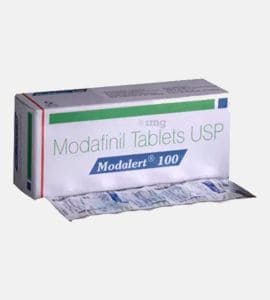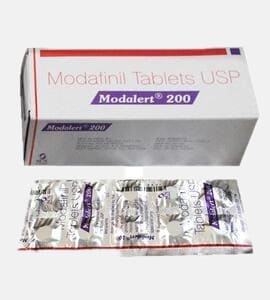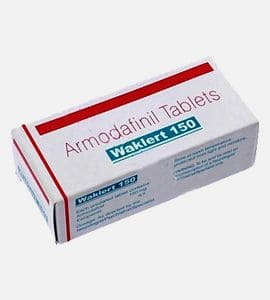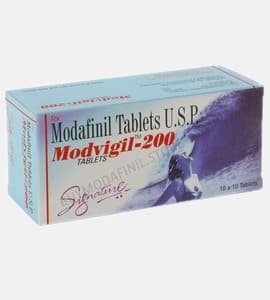Modafinil
Narcolepsy is a condition that causes excessive daytime sleepiness and a tendency to fall asleep suddenly in inappropriate situations (sleep attacks). Modafinil may help treat your narcolepsy and reduce the likelihood that you will have sleep attacks. It has also been used to treat shift work sleep disorder, and sleep apnoea.
Although the exact mode of action is unknown, it is thought modafinil works by inhibiting uptake of a neurotransmitter called dopamine but other mechanisms are also thought to play a role.
How to take Modafinil
Modafinil is usually taken once a day in the morning but can be split into two doses a day if your doctor deems it appropriate. It can be taken with or without food. Tablets should be swallowed whole with water.
Warnings
Like all medicines, this medicine can cause side effects, although not everybody gets them. Stop taking this medicine and tell your doctor straight away if you have any of the following side effects:
• You have sudden signs of allergic reactions such as rash, itching or hives on the skin, difficulty breathing or wheeziness or your face, mouth or throat begins to swell, disorder of lymph node (signs may include painful, warm, red lumps under your skin, fever or unusual tiredness) .
• You notice a skin rash or itching (especially if it affects your whole body). Severe rashes may cause blistering or peeling of the skin, ulcers in your mouth, eyes, nose or genitals. You may also have a high temperature (fever) and abnormal blood test results. (see section 2, Warnings and precautions).
• Diabetes with increased blood sugar (symptoms may include frequent urination, excessive thirst, unexplained weight loss, extreme hunger, sudden change in vision, tiredness).
• You feel any change in your mental health and wellbeing. The signs may include: o mood swings or abnormal thinking,
• aggression or hostility
• forgetfulness or confusion,
• feeling of extreme happiness,
• over-excitement or hyperactivity,
• anxiety or nervousness,
• depression, suicidal thoughts or behaviour,
• agitation or psychosis (a loss of contact with reality which may include delusions or sensing things that are not real), feeling detached or numb, or personality disorder.
Side effects
Very common (may affect more than 1 in 10 people):
• Headache
Common (may affec up to 1 in 10 people):
• Dizziness, feeling irritable
• Sleepiness, extreme tiredness or difficulty sleeping (insomnia)
• Awareness of your heart beat, which may be faster than normal.
• Chest pain
• Flushing.
• Dry mouth.
• Loss of appetite, feeling sick, stomach pain, indigestion, diarrhoea or constipation
• Weakness. Numbness or tingling of the hands or feet (‘pins and needles’).
• Blurred vision.
• Abnormal blood test results showing how your liver is working (increased liver
• enzymes).
Uncommon (may affect up to 1 in 100 people):
• Back pain, neck pain, muscle pain, muscle weakness, leg cramps, joint pain, twitching or tremor.
• Reduced sensation.
• Vertigo (spinning sensation).
• Difficulty moving muscles smoothly or other movement problems, muscle twitching, coordination problems.
• Hayfever symptoms including itchy/runny nose or watery eyes.
• Increased cough, asthma or shortness of breath.
• Skin rash, acne or itchy skin.
• Sweating.
• Changes in blood pressure (high or low), abnormal heart trace (ECG), and irregular or unusually slow heart beat.
• Difficulty swallowing, swollen tongue or mouth ulcers.
• Excess wind, reflux (bringing back fluid from the stomach), increased appetite, weight changes, thirst or taste alteration.
• Being sick (vomiting)
• Migraine.
• Speech problems.
• High blood cholesterol.
• Swollen hands and feet.
• Disrupted sleep or abnormal dreams,
• Loss of sex drive.
• Nose bleed, sore throat or inflamed nasal passages (sinusitis).
• Abnormal vision or dry eyes.
• Abnormal urine or more frequent urination.
• Abnormal periods.
• Abnormal blood test results showing that the numbers of your white blood cells have changed.
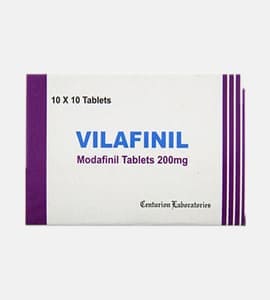

 English
English
 Italiano
Italiano
 Čeština
Čeština
 Español
Español
 Français
Français
 Deutsch
Deutsch
 العربية
العربية
 PLN
PLN


